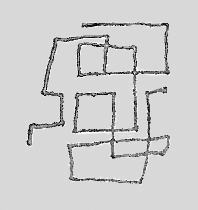Woody started painting in 1995, after enrolling in a psychology course entitled “Art as a Spiritual Practice.” When he passed away in 2018, he left a collection of more than 450 paintings.
Early paintings were oil pastels on index cards. Woody switched to acrylics in 2001, continuing to work on paper. After a short period of larger works around 2006-7, he again went to a small format. He chose 6×9 manila envelopes for most of his later paintings, a size that conserved resources and that he could mail as a postcard for the price of a first-class stamp.
Woody might say his paintings are self-portraits bent on communicating something about being human. They are musical reflections on human experience translated into color. He was always getting at something…
Woody (seated left) with Friends 1984. E. Roecker, photo
Elwood Lee (Woody) Castrodale (1940-2018)
Woody was a full-spoken critical thinker with abiding interest at the crossroads of human psyche, art, culture, and science. He was a musical prodigy and classically trained keyboardist whose unfulfilled vocational desire was to be an organ builder. He was a gay raconteur, provocateur, aesthetic snob, polymath, 4 on the Enneagram, proud Sagittarian born on St. Nicholas Day, physically an ectomorph, philosophically a romantic fatalist. —MLS
Elwood Lee Castrodale was born on December 6, 1940 to Rayner Castrodale, an electrician and industrial clock technician for IBM, and Ethel (Owen) Castrodale, a registered nurse, in Berwyn, Illinois. Woody’s paternal grandparents, Lawrence (Lorenzo) Castrodale and Augusta Olsen emigrated respectively from Italy and Sweden in the early 1890s. Woody was the middle child of three brothers, with Daniel older and Alan younger.
In 1963 Woody graduated from Oberlin College with a Bachelor’s Degree in Biology. After taking various jobs with little career potential, Woody decided to learn computer programming and was soon was hired by Western Electric in Chicago to work on payroll processing countrywide. He moved to San Francisco in 1968, a year after the Summer of Love, and continued to work corporations big and small including Pacific Bell, Bank of America, Stanford University, Judson Branch Research, and others.
In the wake of losing close friends and lovers to AIDS during the epidemic, he resigned from his lengthy career in the corporate world to find a new path. From 1989 to 1993, with AIDS ripping through San Francisco’s gay community, Woody facilitated Kaiser Hospital support groups for seronegative men. He also contributed substantially to Walt Odets’ 1995 study, In the Shadow of the Epidemic: Being HIV-Negative in the Age of AIDS.
While pursuing graduate studies in psychotherapy, Woody worked at a variety of jobs in the Bay Area, including but not limited to: gardener, cook & butler, house manager for a legitimate theater (Theatre Rhinoceros), driving instructor, writing coach, busboy, programming instructor, and book-cooking accountant for a male escort service.
In 1998 he earned a Master’s Degree in Transpersonal Psychology from John F. Kennedy University in Orinda and Oakland, California. As a practicing psychotherapist in Bellingham, Washington (2001-2009), his work was anchored in Freudian analysis and principles of cognitive-behavioral therapy.
During the last few years of his life, Woody suffered increasingly from debilitating medical conditions – Meniere’s Disease, profound hearing loss combined with painful hyperacuity, Parkinson’s Disease (diagnosed posthumously), and dizzying balance problems – that made every day a frightening struggle for him, increasingly devoid of purpose and pleasure.
At age 77 Elwood Lee Castrodale met Death on his own terms when he chose to cease eating and drinking (VSED), with compassionate support from Legacy Hopewell House in Portland, Oregon. During his last week on Earth, he played the piano, entertained the nurses with stories of his life, laughed at his own gallows humor, read Japanese Death Poems, and listened to the songs of robins in the hospice gardens. His bodily departure on May 24, 2018, in the presence of his devoted wife had all the earmarks of a joyous, life-affirming release from suffering.


